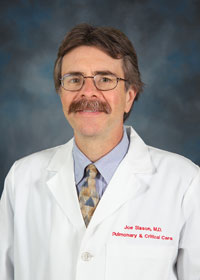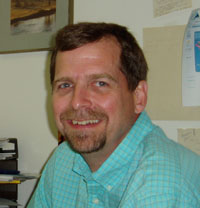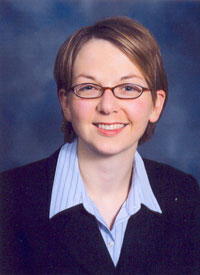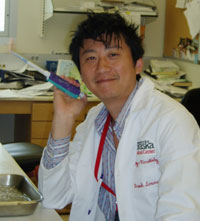Five researchers will receive the 2007 Internal Medicine Research Awards for exceptional achievements in research. The researchers who will receive the awards are:
- Joseph Sisson, M.D., chief, section of pulmonary, critical care, sleep & allergy medicine — Career Excellence Research Award
- Dahn Clemens, Ph.D., section of gastroenterology/hepatology — Basic Science Research Award (for faculty)
- Kristina Bailey, Ph.D., section of pulmonary, critical care, sleep & allergy medicine — Fellowship Research Award
- Kristine Erlandson, M.D., house officer III, department of internal medicine — Resident Research Award
- Shinsaku Togo, M.D., Ph.D. — laureate’s award for a visiting scientist
The awards will be presented Friday during the special internal medicine grand rounds at noon in the Durham Research Center Auditorium. Posters will be on display outside of the auditorium starting at 11:30 a.m. A grand rounds presentation given by Dr. Sisson will follow the awards presentation.
 |
Joseph Sisson, M.D. |
Approximately 15 years ago, Dr. Sisson was the first scientist to report that nitric oxide is a stimulatory regulator of cilia beating. His work has been reproduced and extended by numerous laboratories which have led to hundreds of related publications by dozens of investigators. He has applied his nitric oxide research to the field of alcohol disease and has pioneered the study of alcohol effects on airway clearance. The cilia analysis system he developed is used by laboratories in several countries.
According to Dr. Sisson’s nominator, one of his most important qualities is his ability to mentor. With Dr. Sisson’s grant writing assistance, several junior faculty members in his section have recently been awarded early-career NIH funding. He has mentored Pulmonary Fellows in their basic research training, and that has led to significant research publications. Dr. Sisson has also had many summer undergraduate students under his guidance.
Dr. Sisson’s enthusiasm for all of these aspects of academic medicine makes him an ideal recipient of this award. In addition to his research accomplishments, he has received numerous teaching awards in his career to date including the Dept of Medicine’s Sir William Osler award and the College of Medicine’s Outstanding Teacher award. Students and residents know him best because of his excellent bedside teaching in the adult medical intensive care unit. He is also recognized as a skilled administrator and serves as the chief of the pulmonary, critical care, allergy and sleep medicine section. He was the interim chairman of the department of internal medicine from 1999 to 2001, and during that time created a database system known as ADIS that is now being used in other departments within the College of Medicine.
 |
Dahn Clemens, Ph.D. |
Dr. Clemens is the author or co-author of 27 peer-reviewed publications, eight of which have been written since 2004. He is an invited author of a review for Alcohol Research and Health on models of alcohol injury and cultured cells, which will be published in 2007. His work has been presented at important meetings including the American Association for the Study of Liver Disease, the Research Society on Alcoholism, and the International Society for Biomedical Research on Alcoholism. He also has reviewed for many notable journals including DNA and Cell Biology, In Vitro Cellular & Developmental Biology, Alcoholism: Clinical and Experimental Research, Alcoholism, Alcohol, Alcohol Research & Health, and Free Radical Biology & Medicine.
Dr. Clemens has a successful record of funding as the principal investigator of both NIH and VA grants. He recently was awarded an NIH R21 grant for his proposal “The Effects of Ethanol on Pancreatic Regeneration.” He has a funded VA research program. In addition to his own projects, Dr. Clemens has actively collaborated as co-investigator on several NIH and VA-funded projects.
Some of Dr. Clemens’ recent research accomplishments include the development of a new model of alcohol pancreatitis and the creation of a liver cell line that expresses both alcohol dehydrogenase and cytochrome P-450 2E1. An important feature of the hepatoma cell line is that it retains the machinery for alcohol metabolism. This allows for more accurate studies of the role of alcohol in liver injury.
 |
Kristina Bailey, M.D. |
The focus of Dr. Bailey’s research has been on innate immunity of the airways. Her projects have examined the changes in expression of toll receptors and how they are changed in the airways following exposure to organic dust and/or alcohol treatment.
Dr. Bailey has already been recognized for her work in this area. She applied for and was awarded a competitive NIH/NIAAA NRSA research fellowship training grant for her proposal titled “Alcohol Modulates TLR2 in Airway Epithelial Cells,” that is currently in the first of two years of funding. She has also presented both posters and oral presentations at regional and national meetings including at the American College of Chest Physicians’ meeting, the American Thoracic Society’s meetings, and the American College of Physicians’ meetings.
Her nominator said he “has been very impressed with her motivation, her hard work ethic, her outstanding writing skills, and her intellectual curiosity.” Dr. Bailey already has received a commitment to be recruited as a faculty member in the section of pulmonary, critical care, sleep and allergy medicine in July 2008 when her research fellowship is completed.
 |
Kristine Erlandson, M.D. |
As a result of this effort, her abstract, “Impact of More Potent Antibiotics on Outcome Measures of Patients with Vancomycin-Resistant Enterococcus (VRE) Bacteremia,” was presented at the Annual Meeting of the Infectious Disease Society of America in October 2006. A full-length manuscript of this work has also been submitted to Clinical Infectious Diseases, a premier journal of the subspecialty of infectious diseases. Dr. Erlandson is first author on this article.
This project and the creation of the VRE database has led Dr. Erlandson to further collaboration with Pete Iwen, Ph.D., of the department of pathology and mircobiology. As a result of this second project, she is listed as second author on an abstract titled “Incidental Findings of Vancomycin-Resistant Enterococcus (VRE) Species in Stool and the Subsequent Development of Systemic VRE Infection,” which was presented at the Annual Meeting of the American Society for Microbiology in May 2007. She is also collaborating with Andre Kalil, M.D., of the infectious diseases section, on an analysis of immunosuppressive therapy and infectious complications in transplant recipients. Again despite a heavy clinical load, Dr. Erlandson has managed to publish two case reports on interesting infectious disease cases: a review paper on intestinal spirochetosis and she characterized an Aspergillus outbreak at a burn center.
A newly established award, the Internal Medicine Laureate’s Award for a Visiting Scientist, is made possible by the generosity of Stephen Rennard, M.D., professor of medicine in the pulmonary, critical care, sleep, and allergy medicine section. Earlier this year, Dr. Rennard was the first faculty member to receive the UNMC Scientist Laureate award. The Scientist Laureate award was established as the highest recognition given to a UNMC scientist. A monetary award of $20,000 that was given in conjunction with the Scientist Laureate award is being donated by Dr. Rennard to establish this new category of the Internal Medicine Laureate’s Award for a Visiting Scientist. As with the other Internal Medicine Research Awards, nominations are requested, reviewed, and voted on by the Internal Medicine Research Council.
 |
Shinsaku Togo, M.D., Ph.D. |
Dr. Togo was extremely industrious in his project with the functional phenotype of fibroblast in COPD patients. He has a whole series of publications planned that will cover topics such as collagen gel contraction/chemotaxis mediated by PGE and TGF-Beta, VEGF and endostatin, IL-8 and neutrophil chemotaxis, SDF1, and MMPs. The first of these is ready for submission to the Journal of Clinical Investigation, and an abstract was presented at the recent American Thoracic Society meeting.
While at UNMC, Dr. Togo completed an evaluation of the role of phosphodiesterase (PDE) 4 for inhibitors in modulating TGF-Beta regulated fibroblast repair responses. Abstracts have been presented at the European Respiratory Society and the American Thoracic Society meetings on this topic, and a manuscript is nearly ready for submission. Dr. Togo also extended these studies to include the role for PDE5 in modulating fibroblast functions.
Finally, Dr. Togo worked on in vitro differentiation of human embryonic stem cells in the presence of cytokines. His work, in human cells, confirmed previous observations made in murine cells that fibroblast differentiation into stable phenotypes can be driven by specific cytokines. An article is also in preparation for this project.